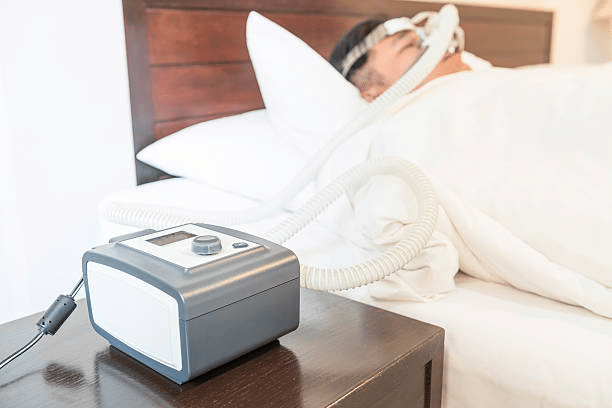Sleep apnea, a common disorder that causes disruptions in breathing during sleep, has been linked to numerous health conditions, including diabetes. According to the American Diabetes Association, people with sleep apnea are at an increased risk of developing type 2 diabetes, and those with diabetes are more likely to have sleep apnea.
While the exact mechanisms linking the two conditions are still being studied, evidence suggests that treating sleep apnea with continuous positive airway pressure (CPAP) therapy may improve diabetes control.
In this article, we’ll explore the latest research on the topic, discuss how to identify the signs and symptoms of sleep apnea, and provide tips for managing diabetes and sleep apnea together. Read until the end to learn more.
The Link Between Sleep Apnea And Diabetes

Diabetes and sleep apnea are two widespread chronic diseases impacting millions globally. Although diabetes affects how the body utilizes insulin to control blood sugar levels, sleep apnea is a metabolic disease characterized by breathing interruptions while sleeping.
Recent research has shown a connection between sleep apnea and diabetes, despite the disorders’ apparent lack of connection. This connection may have significant repercussions for those who have both conditions.
Both sleep apnea and diabetes might increase each other’s symptoms. Both persons with sleep apnea and those with diabetes are at a higher risk of getting the condition. Various possibilities exist, but the precise mechanism behind this association is not yet completely known.
According to one idea, type 2 diabetes may be developed due to insulin resistance, a known risk factor for sleep apnea. As the body’s cells lose their sensitivity to insulin, they are less able to take glucose from circulation. This condition is known as insulin resistance. High blood sugar levels result from this, which may result in several health issues.
Sleep Apnea’s Potential Role in the Development of Diabetes
A different hypothesis holds that sleep apnea might cause inflammation, which can aid in the development of diabetes. Infection and injury cause inflammation, which can damage tissues and organs. Inflammation is more likely to occur in sleep apnea patients, and inflammation may exacerbate insulin resistance and other diabetes-related symptoms.
Sleep apnea and diabetes have been linked in several significant research. Those with sleep apnea were more likely to acquire diabetes than those without sleep apnea, according to one analysis, the Sleep Heart Health Study, which tracked nearly 6,000 participants for eight years.
The Role Of CPAP Therapy In Managing Sleep Apnea And Diabetes
Obstructive sleep apnea (OSA) is a chronic sleep disease characterized by disrupted breathing and low oxygen levels due to the partial or total collapse of the upper airway during sleep.
A higher risk of several diseases, including diabetes mellitus, has been associated with OSA. High blood sugar levels result from diabetes mellitus, a metabolic condition that alters how the body uses glucose.
Continuous positive airway pressure (CPAP) treatment may be a proper management strategy for both OSA and diabetes, according to current research that has examined the relationship between the two illnesses.
Reducing Snoring, Daytime Drowsiness, And Exhaustion
A machine that continuously pumps pressured air via a mask placed over the nose or mouth is used in the non-invasive treatment known as CPAP therapy. During sleep, the pressure maintains the airway open, keeping the upper airway from collapsing and guaranteeing a constant flow of oxygen. Snoring, daytime drowsiness, and exhaustion are some of the OSA symptoms that CPAP treatment may significantly reduce.
A Solution To Lower The Risk Of Diabetes
According to research, OSA is linked to insulin resistance, a significant risk factor for type 2 diabetes. Insulin resistance happens when the body’s cells stop responding to this hormone, which is generated by the pancreas and aids in controlling blood sugar levels. As a result, the risk of acquiring diabetes and high blood sugar levels rises.
In those with OSA, CPAP treatment has been demonstrated to increase insulin sensitivity. Compared to a control group, CPAP treatment significantly improved insulin sensitivity in a trial of individuals with type 2 diabetes with OSA. According to further research, CPAP treatment helps individuals with OSA maintain better glycemic control and lowers their chance of acquiring diabetes.
Many studies have examined OSA, diabetes, and CPAP treatment. In a randomized controlled study of type 2 diabetics with OSA, CPAP therapy dramatically improved glycemic control compared to sham CPAP. In individuals with type 2 diabetes and OSA, CPAP treatment improved blood pressure and glucose metabolism.
Maximizing Diabetes and OSA Health Outcomes With CPAP Therapy
Although CPAP treatment has been demonstrated to reduce the symptoms of both OSA and diabetes, patients must utilize the therapy consistently and often to reap the advantages. Having trouble adhering to CPAP treatment is a typical problem since many patients experience pain and difficulty doing so. Yet, it has been shown that consistent CPAP treatment usage dramatically reduces the risk of issues related to both OSA and diabetes and the symptoms of OSA.
Diabetes and OSA are two widespread health issues connected. Both diseases may be well managed with CPAP therapy, which also increases blood pressure, glycemic management, and insulin sensitivity. However, it must be used consistently and regularly to fully benefit from CPAP therapy. Individuals with diabetes and OSA should collaborate with their healthcare physicians to create a specialized treatment plan and explore the advantages of CPAP therapy.
Also Read: Can CPAP Treatment Help Manage High Blood Pressure?
The Benefits of CPAP Therapy for Diabetes Management

Diabetes management can be a challenging and complex, but recent research has shown that CPAP therapy may benefit individuals with the condition.
CPAP therapy is a non-invasive treatment option for sleep apnea that involves wearing a mask over the nose and/or mouth during sleep to deliver a continuous flow of air and prevent apnea episodes. Here are some of the potential benefits of CPAP therapy for diabetes management:
- Improved blood sugar control
- Reduced risk of complications
- Better sleep quality
A Strategy For Diabetes Management In Patients With OSA
The outcomes of several research looking at how CPAP therapy affects diabetes control have been encouraging. One analysis indicated that four months of CPAP treatment in individuals with OSA and type 2 diabetes led to substantial reductions in HbA1c levels, a gauge of long-term blood glucose control. This study was published in the journal Diabetes Care.
CPAP treatment enhanced insulin sensitivity in patients with OSA and pre-diabetes when blood glucose levels are higher than usual but not yet in the diabetic range, according to further research published in the journal Sleep Medicine.
A meta-analysis of 13 trials with over 500 participants found that CPAP treatment reduced fasting blood glucose, insulin resistance, and HbA1c in OSA and type 2 diabetes patients. These results imply that CPAP treatment may be a helpful strategy for individuals with OSA to manage their diabetes.
CPAP Treatment Help’s Lower Insulin Resistance And Improve Glycemic Control
Increasing glucose and glycemic control is one way CPAP treatment may help with diabetes management. OSA is connected to insulin resistance, a disorder in which cells become insulin-resistant and blood glucose levels rise.
CPAP treatment can reduce insulin resistance by lowering the frequency and length of breathing pauses during sleep, which may result in improved glucose management.
CPAP reduces sleep fragmentation, which is characterized by frequent breathing pauses, snoring, and gasping for air. Blood glucose rises brought on by interrupted sleep may be especially harmful to diabetic people. CPAP may improve glycemic control and reduce diabetic complications by improving sleep quality and fragmentation.
Best Practices For Incorporating CPAP Therapy Into Diabetes Management
CPAP therapy can treat obstructive sleep apnea (OSA) and manage diabetes. CPAP therapy improves glucose control, glycemic control, and cardiovascular disease risk.
Here are some best practices for successfully using CPAP therapy to manage both conditions.
Selecting The Right CPAP Machine And Mask
You must choose the best CPAP machine and mask for your treatment to be effective. The effectiveness and comfort of various devices and masks vary. A professional sleep expert or DME supplier can help you choose the right machine and mask.
Several CPAP machine models include bilevel positive airway pressure (BiPAP), auto-titrating CPAP, and regular CPAP devices. Instead of setting pressure, the auto-titrating CPAP machine adjusts to the user’s needs during the night. Several pressure settings are offered by BiPAP devices for inhalation and expiration.
Selecting the appropriate mask is also crucial. Masks come in various styles, including nasal, full-face, and nasal pillow masks. Whereas the full-face mask also covers the mouth, the nasal mask covers the nose. In the nostrils, the nasal pillow mask is worn.
Making CPAP Therapy A Regular Part Of Your Diabetes Management Routine
To get the intended health effects, CPAP treatment must be used regularly. The American Academy of Sleep Medicine recommends four hours of nightly CPAP therapy to treat OSA. Studies have shown that using CPAP treatment for extended periods may result in more significant gains in managing diabetes.
Your diabetes treatment regimen may benefit from using CPAP therapy to guarantee frequent usage. Use your CPAP machine every night, and set regular times for going to sleep and waking up. A comfortable sleeping environment, such a cool, dark room, helps CPAP work better.
Additional Lifestyle Modifications
In addition to using CPAP therapy, lifestyle modifications can help improve diabetes management. A healthy diet and regular exercise are essential for managing diabetes. A diet rich in fruits, vegetables, whole grains, lean proteins, and healthy fats can help regulate blood sugar levels. Regular exercise can also improve glucose control and insulin sensitivity.
Maintaining a healthy weight is also important for managing both OSA and diabetes. Obesity is a significant risk factor for OSA, and excess weight can worsen diabetes symptoms. Losing weight through diet and exercise can improve the effectiveness of CPAP therapy and improve diabetes management.
Regular Monitoring Of Blood Glucose Levels
For effective diabetes control, blood glucose levels must be regularly monitored. Continuous glucose monitoring (CGM) may assist people with diabetes in routinely monitoring their blood glucose levels. CGM devices may provide real-time data on blood glucose levels, enabling users to modify their diabetes care strategy as necessary.
CPAP treatment improves glucose and glycemic management and reduces cardiovascular disease risk. Practical CPAP treatment includes choosing the right machine and mask, using it regularly, making lifestyle adjustments, and testing blood glucose levels. Make a CPAP therapy-inclusive diabetes management strategy in consultation with your healthcare physician.
Conclusion
The relationship between sleep apnea and diabetes is complex, and effective management of both conditions is crucial for overall health and well-being. CPAP therapy has been shown to be an effective treatment option for sleep apnea, and numerous studies have indicated its potential benefits for individuals with diabetes.
Sleep apnea and diabetes patients who use CPAP regularly may lower their risk of cardiovascular disease. Lifestyle changes including eating well, exercising, and losing weight can help manage both illnesses. Ready to make a positive change? Explore our selection of CPAP products designed to aid in the effective management of sleep apnea and diabetes. Thanks for reading!



